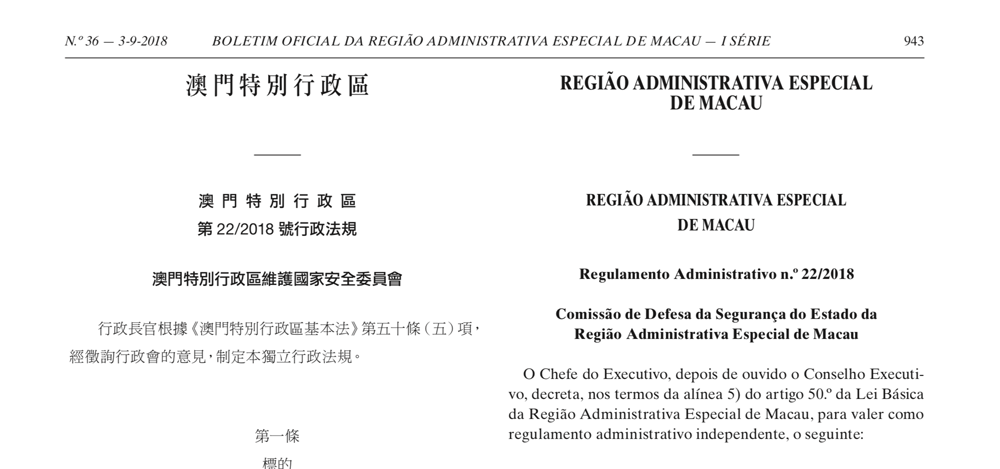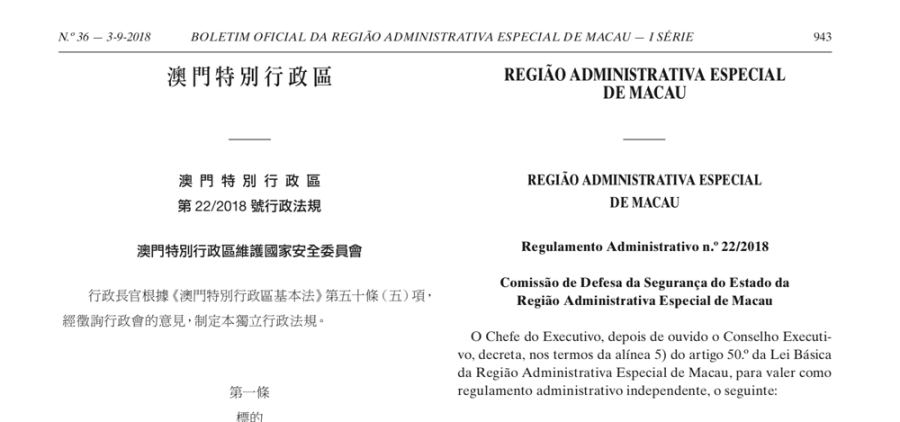The Commission on the Defence of National Security of the Macau Special Administrative Region (MSAR) will start operating next month, the local government announced Monday.
The announcement came in the form of the promulgation in Mondsay’s Official Gazette (BO) of an administrative regulation (by-law) on the setting-up of the commission.
According to Article 18 of the regulation, it will take legal effect 30 days after its promulgation, i.e. early next month.
The by-law regulates the tasks of the commission and those of its support entities such as a permanent office.
The establishment of the commission was announced by Executive Council spokesman Leong Heng Teng last Monday.
Leong stressed at that time that the commission will be tasked with formulating local policies on the safeguarding of national security and coordinating tasks concerning legislation on the protection of national security.
Leong also stressed that the new commission is not an entity for the enforcement of the local national security law – the Law on the Defence of National Security. He underlined that the commission will be tasked with assisting the chief executive in policymaking for matters concerning the protection of national security in Macau.
According to the regulation, the commission will be headed by the chief executive and consist of 9 members, among them the secretary for security as the commission’s vice-president, the secretary for administration and justice, and the heads of the Unitary Police Service (SPU) and Judiciary Police (PJ).
According to Article 3, one of the commission’s main tasks it to defend the nation’s sovereignty, security and development interests, as well as to assess the MSAR’s social stability and national security situation.
According to the regulation, the commission meets at least once every six months. However, the commission can hold extraordinary meetings on the initiative of the chief executive or upon the written request of one-third of its members. The commission cannot meet without the presence of the president (chief executive) or vice-president (secretary for security).
The commission can only meet if at least two-thirds of its members are present. However, in the case of “exceptional urgency”, the chief executive may call a meeting even without the necessary quorum.
Each meeting ends with a record of proceedings to be voted on and approved by its members at the end of the meeting or at the start of the next meeting.
One of the main functions of the commission’s office is to submit an annual report to the commission by the end of each year. The office will be headed ex officio by the secretary for security and Judiciary Police director as chief and deputy chief respectively.
The Judiciary Police are tasked with supporting the commission and its office with human, technical, administrative and financial resources.
Article 16 of the regulation states that all paper work resulting from the commission’s meetings is deemed confidential, while the commission’s reports, directives and guidelines are not to be published, except by decision to the contrary by the chief executive who also may lift the commission’s confidentiality rule.






